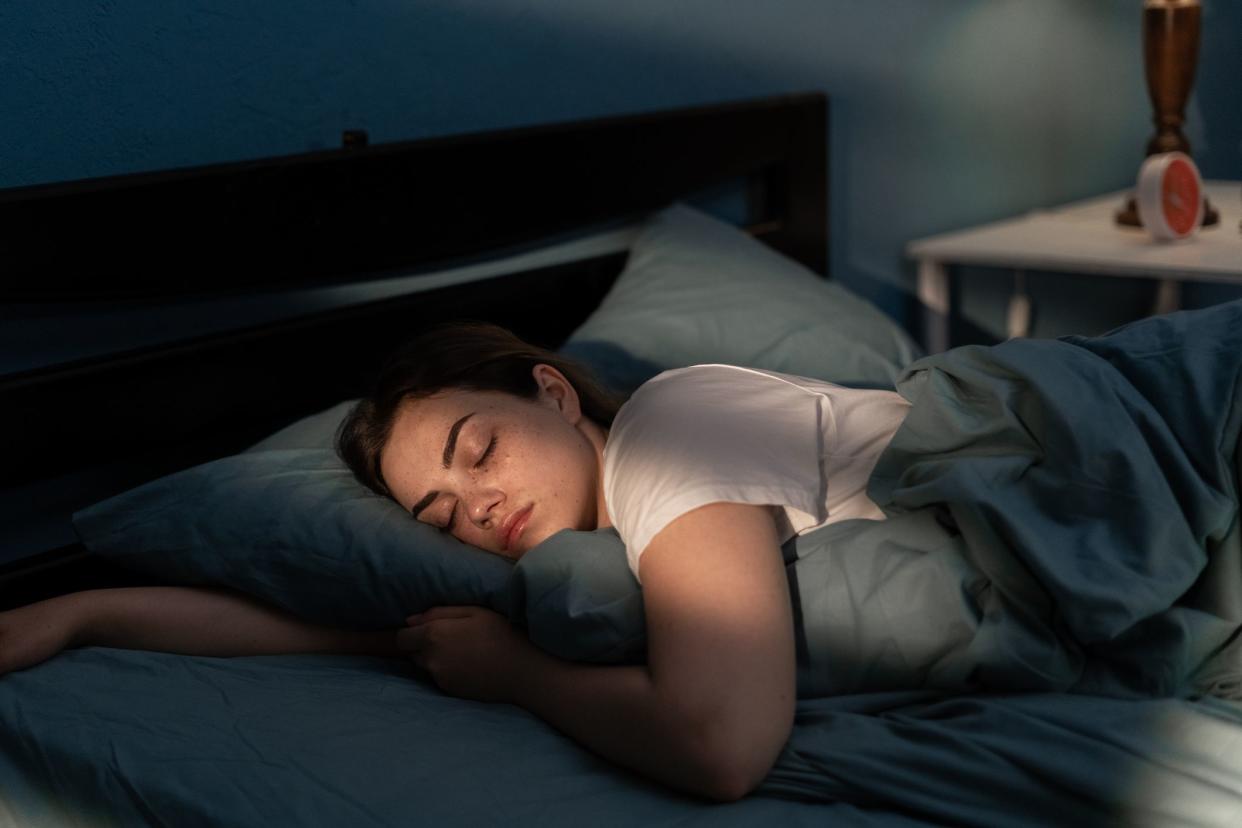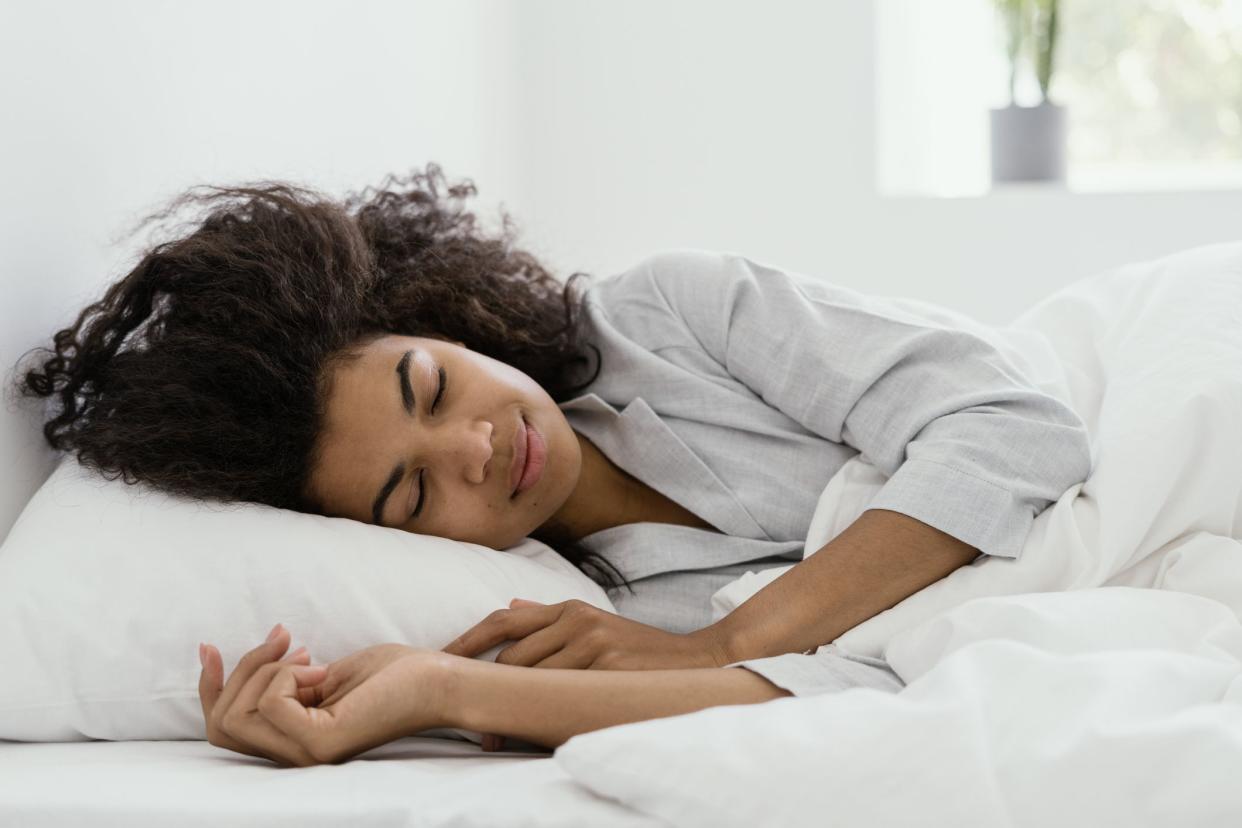9 Tips to Increase Deep Sleep (& How That Could Help You Lose Weight)


9 Tips to Increase Deep Sleep (& How That Could Help You Lose Weight)
Deep sleep refers to slow-wave sleep — a stage in the sleep cycle when brain waves slow down. Getting enough deep sleep is crucial for numerous bodily functions. But how to increase deep sleep isn’t always straightforward.
Most adults who sleep the recommended seven to nine hours a night get about one to two hours of deep sleep. So, if you want to wake up feeling rested and rejuvenated — who doesn’t? — deep sleep should account for about 25 percent of your total shut-eye time.
If you regularly have restless nights of tossing and turning or you think you’re sleeping but still wake up feeling super tired, you might not be getting enough deep sleep.
We’re here to help. Ahead, find a quick overview of the stages of sleep and why deep sleep matters. Then, we’ll share strategies for increasing the amount and quality of deep sleep you get.
Let’s dive in and discover how to get more deep sleep to make your nights as restorative as possible.


Why Deep Sleep Matters: Understanding the Sleep Stages
Your total sleep time — ideally about eight hours — is broken down into a few cycles. Then those cycles are broken into stages within two categories: NREM sleep (non-rapid eye movement sleep) and REM sleep (also known as rapid eye movement sleep).
Your brain activity changes during each stage. Here’s a rough rundown of what happens in each one:
-
NREM, stage 1: light sleep. About five percent of your total sleep time is light sleep. It happens as you fall asleep and drift away from wakefulness. In this stage, your breathing patterns are about the same as when you’re awake.
-
NREM, stage 2: deep sleep. This deep sleep stage makes up about 45 percent of your total sleep. Your heart rate slows and your temperature drops, promoting rest and recovery. You’ll also experience bursts of brain activity that help with memory consolidation.
-
NREM, stage 3: deeper sleep. Known as slow-wave sleep or stage 3 non-REM sleep, this is the deepest stage of sleep and the hardest to wake up from. Brain activity slows down, muscles and bones strengthen, hormones regulate, and the immune system is supported.
-
REM, stage 4. During REM sleep, your brain is almost as active as when you’re awake. Vivid dreams unfold as your brain processes the day’s information and emotions.
Long story short, every stage of sleep is important. And slow-wave sleep, or stage 3 of non-REM sleep, is especially vital for restorative rest.
Most people get around 1.5 to two hours of slow-wave sleep if they get eight hours of shut-eye. This stage is key to waking up refreshed and ready for the day — and it’s what you’re hoping to increase with the tips in this post. (Learn more about Is Oversleeping Bad? Potential Causes and Side Effects.)


9 Sleep Habits to Help You Get More Deep Sleep
If you’re wondering how to increase deep sleep naturally, a holistic approach is the way to go. Making lifestyle changes that improve your overall sleep hygiene (and health!) can make a big difference.
We recommend:
-
Establishing a relaxing bedtime routine
-
Working on stress management
-
Sticking to a consistent sleep schedule
-
Upgrading your sleep environment
-
Rethinking your daytime habits
-
Putting screens away
-
Avoiding long naps during the day
-
Being mindful of noise
-
Considering supplements
Some strategies will specifically target deeper sleep stages, but most are about enhancing your overall sleep habits.
Let’s explore them together.


1. Establish a Relaxing Bedtime Routine
After a busy day, it can be hard to shift your energy to relaxation mode or “shut off” your brain. But there are things that can help you get there, starting with your bedtime routine.
Some tactics include:
-
Having a cup of herbal tea. One small study on folks with chronic fatigue found that drinking herbal teas before bed might improve sleep quality. Other preliminary research shows that it may help reduce stress before bed, too.
-
Reading a book. Reading a book can also make it easier to fall asleep (though it probably won’t improve the overall quality of sleep or lead you right into deep sleep).
-
Taking a warm bath. According to one review, soaking in the tub might be linked to getting a better night’s sleep.
-
Getting comfortable. One study showed that getting warm and cuddling up right before bed can help prepare your body for rest.


2. Work on Stress Management
If you’re exhausted all day, only to feel wide awake with racing thoughts as soon as your head hits the pillow, something like stress or anxiety could be the culprit.
In that case, managing stress may boost overall sleep quality, including deep sleep time.
Consider incorporating healthy outlets — like yoga, meditation, or breathing exercises — to help calm your mind during the day. You might even want to include these relaxation techniques in your nighttime routine to make it easier to fall asleep and stay asleep.


3. Stick to a Consistent Sleep Schedule
Having a consistent bedtime routine — going to bed and waking up at the same time each day — might significantly improve your overall well-being. In fact, research shows that going to bed earlier and maintaining a regular sleep schedule is linked to better health outcomes.
On the flip side, later sleep timing (aka going to bed late) and an inconsistent sleep schedule are generally associated with negative health outcomes.
It can be tough to establish a new routine, but it’ll eventually become a habit that feels effortless. One study suggests it takes about eight and a half weeks for new habits to feel automatic. This means your body will start craving bedtime at a particular hour, making it easier to wind down and drift off.
To build this habit and get a consistently good night’s sleep, consider keeping a sleep diary. It can help you track your patterns and identify areas for adjustment, like aiming to hit the hay a bit earlier.


4. Upgrade Your Sleep Environment
Sleep environment can greatly impact sleep quality.
For example, studies show that room temperature plays a critical role in circadian rhythm (the body’s internal clock) and overall sleep quality, especially during deep sleep stages like slow-wave sleep. If you’re too hot or too cold, it can disrupt these important phases.
A comfortable temperature is typically between 65 °F and 68 °F. But it’s not all about what you set the thermostat to — your bedding can also help manage your body temperature.
Consider swapping bedding to suit the seasons. Think breathable linens in summer and cozy flannel in winter, along with appropriate comforters.
For better sleep, you might also:
-
Install blackout shades to block out external light, helping you fall asleep more easily. A light-blocking sleep mask can be a good backup.
-
Invest in a quality pillow that suits your body type and sleeping position. The right pillow can improve your comfort and sleep quality.


5. Rethink Your Daytime Habits
Daytime habits can significantly influence sleep quality.
Here are some simple changes that might help you sleep better:
-
Limit excessive caffeine intake, especially later in the day. Enjoying one to three cups of coffee earlier in the day can boost your energy without interfering with sleep, but too much could lead to sleep issues and fatigue the next day. Caffeine blocks the chemical adenosine, which signals our body to become drowsy.
-
Stay active. Regular physical activity has been shown to improve sleep quality. Aim for a couple hours of moderate-intensity exercise spread throughout the week to reap the benefits.
-
Eat a balanced diet. You get lots of essential nutrients — like fiber and magnesium — from food. They can help support overall health, including energy levels and sleep. Focus on nutrient-rich whole foods, like legumes, greens, lean proteins, and whole grains.
-
Cut back on alcohol. Alcohol can interfere with the neurotransmitters (brain chemicals) that help regulate sleep. In other words, drinking can lead to sleep problems. Reducing alcohol — especially before busy days — might help you sleep better and wake up feeling more refreshed.


6. Put Screens Away
Try to limit smartphone, tablet, and computer use well before bedtime. Some research shows that the bright lights from screens can disrupt your sleep-wake cycle, making it harder to get quality rest.
Reducing exposure to artificial blue light might improve your sleep quality. Prioritizing this change can help you feel more rested and rejuvenated.
Plus, it’s easy to lose track of time scrolling through social media — valuable time that could be spent sleeping.


7. Avoid Long Naps During the Day
In one review of studies, researchers found that sleep inertia — that groggy feeling after waking — can lower cognitive performance. But this gradually improves the longer you’re awake.
You might feel sleepier if you nap for too long, leading you into deeper sleep stages and waking you up when your brain is less active. Long naps could also disrupt your circadian rhythm and make it harder to sleep at night.
If you do want to (or need to) nap, limit it to 20 or 30 minutes — and don’t take one too late in the afternoon.


8. Be Mindful of Noise
We’ve covered temperature, lighting, and habits, but let’s talk about noise — it can greatly impact your sleep quality, too.
Some sound-related sleep tips:
-
Use a noise machine or a white noise playlist on your phone. Some people find that soothing background sounds help them stay asleep without disturbing their rest.
-
Opt for an alarm clock that wakes you up slowly. A gentle alarm clock that wakes you up gradually (perhaps by mimicking the sunrise) might make rising feel less jarring and help you feel more rested. It’s especially important not to wake up abruptly during the deeper sleep stages. Rousing then can make you feel groggier.
-
Consider bedroom sound absorption. You can improve your bedroom acoustics by adding soft materials like rugs and curtains, which can absorb sound and reduce echo.
Small changes can make a big difference in creating a peaceful sleep environment.


9. Consider Supplements
If you’re having trouble falling asleep, magnesium supplements might help.
And while they might not directly improve or increase deeper sleep stages, some research suggests melatonin supplements can make it easier to fall asleep and establish better sleeping patterns.
Still, it’s always best to consult a healthcare provider before starting any new supplements to ensure they’re right for you. Taking that extra step can help you find the best approach for sleeping better.


What Happens If You Don’t Get Enough Deep Sleep
Not getting enough deep sleep — or sleep in general — can lead to sleep deprivation, which affects:
-
Mood. You might feel more irritable or anxious. Lack of sleep is also linked with an increased risk of mental health challenges.
-
Energy levels. Fatigue can make daily tasks feel overwhelming.
-
Overall functioning. Your ability to concentrate and make decisions may decline.
Sleep deprivation is also linked to serious health issues, including:


Reasons for Lack of Deep Sleep When to Talk to a Healthcare Provider
If you’ve been following sleep tips but still struggle with deep sleep, or if you suspect a sleep disorder like sleep apnea or restless leg syndrome, you’re wise to seek professional help.
There’s also a condition called shallow deep syndrome, or nonrestorative sleep. This happens when you do sleep but never really wake up feeling rested.
Also, some research shows that certain medications, such as benzodiazepines, tricyclic antidepressants, and barbiturates, can reduce deep sleep.
Reaching out to a healthcare provider can be a great next step if you think something more serious is causing your sleep issues — or if you worry your chronically poor sleep may lead to other medical problems.
They can help identify any underlying issues affecting your sleep and work with you to create a treatment plan or prescribe sleep medicine if needed.


How to Increase Deep Sleep: Final Thoughts
As you can probably tell by now, getting enough deep sleep is essential for your overall well-being. The good news is that you can take steps to increase deep sleep and optimize other types of sleep.
Here’s what to keep in mind about deep sleep and improving your sleep hygiene:
-
Deep sleep matters. This sleep stage (slow-wave or stage 3 non-REM sleep) is vital for feeling rested, improving mood, and supporting bodily functions.
-
It should be 25 percent of total sleep. Adults should aim for seven to nine hours of sleep each night, with one to two hours dedicated to deep sleep.
-
Some things can interfere with deep sleep. Factors like stress, inconsistent sleep schedules, and certain conditions or medications can affect the amount of deep sleep you get.
-
There are tons of strategies for improving sleep. These include establishing a bedtime routine, managing stress, sticking to a consistent sleep schedule, upgrading your environment, rethinking daytime habits, and seeking help when you need extra support.
Remember, prioritizing sleep is essential for overall health, and taking steps to improve it can have major benefits.
This article originally appeared on ForHers.com and was syndicated by MediaFeed.org.


More from MediaFeed
link






